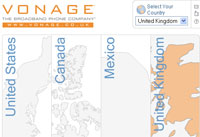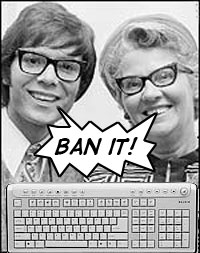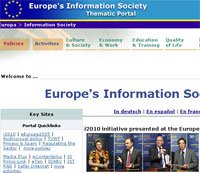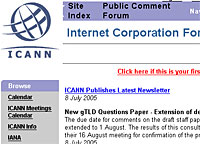 UK Super-regulator Ofcom have today published details of a new regulatory approach for the UK’s fixed line telecommunications market.
UK Super-regulator Ofcom have today published details of a new regulatory approach for the UK’s fixed line telecommunications market.
We think this information is significant enough to be reproduced without editing.
A new regulatory approach for fixed telecommunications
Ofcom today published details of a new regulatory approach for the UK’s fixed line telecommunications market.
Ofcom has concluded that a new approach is necessary for the longer term, based on real equality of access to those parts of the fixed telecoms network which BT’s competitors cannot fairly replicate.
This new approach to regulation has six objectives:
- to drive down the price of calls, connections and services for consumers and businesses;
- to support more innovation through the growth of competitive products and services, such as faster broadband, television and voice over the internet and video-on-demand, from a range of credible companies;
- to provide regulatory certainty for providers and investors so that they commit to developing, marketing and extending these products and services for UK consumers and businesses;
- to re-focus regulation where it is truly needed, with swifter remedies to tackle anti-competitive behaviour and a structure which delivers equivalence to a timetable with real penalties and incentives;
- to remove regulation wherever competition is effective and the effect of open markets – rather than regulatory intervention – ensures the delivery of choice, value and quality for consumers; and
- ensure the necessary level of consumer protection through a combination of codes, sanctions and effective consumer information.
Ofcom Chairman David Currie said: “We believe these proposals have the potential to encourage more sustainable competition, more services, lower prices and greater consumer choice.”
Ofcom Chief Executive Stephen Carter said: “Effective regulation for the telecommunications industry needs to be forward looking, needs to encourage competition in the right places and needs to deliver tangible benefits for customers.”
He added: “These proposals are substantially different to traditional telecommunications regulation. They demand significant changes in key areas, and recognise that in other areas regulation can be rolled back.”
Proposed Undertakings
On Tuesday 21 June the Board of BT Group plc agreed in principle to offer to the Ofcom Board legally binding undertakings in lieu of a reference under the Enterprise Act. On Wednesday 22 June 2005 the Ofcom Board accepted this offer.
The proposed undertakings commit the company to substantive changes in organisation and behaviour; full detail of the proposed undertakings will be published on 30 June 2005.
A more detailed Ofcom Statement can be found online at www.ofcom.org.uk/consult/condocs/telecoms_p2/statement/
This news release should be read in conjunction with that statement. The full undertakings – which will be subject to final consultation – will be published on 30 June, together with a number of other proposals relevant to securing greater competition in the fixed line market, the details of which follow later in this news release.
- Enforceability. The final undertakings to be offered by the Board of BT Group plc will be in lieu of a reference to the Competition Commission under Section 155(1) of the Enterprise Act 2002. They will be legally binding and enforceable, and will mean that:
- in the event of a breach, Ofcom could take the matter to the High Court. The Board of BT Group plc would then be responsible for ensuring compliance with the order of the Court;
- third-parties affected by a breach could also seek damages via the Court to recover losses incurred; and
- these undertakings will sit alongside Ofcom’s existing competition and regulatory power.
Ofcom will publish the final undertakings for a six week consultation on 30 June 2005.
- Branding and identity. The proposed undertakings offered by BT will stipulate the setting up of a new – and operationally separate – business unit, provisionally entitled Access Services, but with a distinct new brand and identity to be devised in the coming weeks. The new business unit will be staffed by around 30,000 employees presently responsible for the operation and development of BT’s local access networks. It will have:
- separate physical locations for management teams;
- separate bonus schemes; whilst the new business unit’s staff will remain BT Group plc employees, their long-term incentive plans will be changed to a new scheme which reflects the objectives of the new business unit, not those of the BT Group plc; and
- over time, new branding on uniforms and vehicles which emphasises its operational separation from BT Group plc.
- given the limited size of the market in Northern Ireland (and, as a consequence, BT’s current operational structure in Northern Ireland), BT has proposed – and Ofcom has accepted – that the three operational changes above will not apply to Northern Ireland. However, all other aspects of the proposed undertakings will apply equally across the whole of the UK; and
- separate operating and trading systems.
- Product equivalence. The new business unit will be required, through a set of formal rules on governance and separation, to support all providers’ retail activities (including those of BT Retail) on a precisely equivalent basis, which Ofcom terms “Equivalence of Input”. Equivalence of Input will mean that all providers will benefit from:
- the same products, with equal opportunity to contribute to the development of new products;
- the same prices, offered to all providers equally; and
- the same processes, to ensure all providers are able to order, install, maintain and migrate connections for their customers on equal terms.
- Products and services. The new business unit will offer a universally available product and service set:
- Local Loop Unbundling (LLU) products, including fully unbundled loops (where a provider takes full responsibility for all of the customer’s voice and broadband services) and shared loops (where BT Retail continues to provide voice services and another provider is responsible for broadband).
- All forms of Wholesale Line Rental (WLR), where a provider takes responsibility for all voice services and provides a single bill for both line rental and calls.
- Backhaul products, which are used to connect the local access network to the core network. Some providers have built out their own backhaul networks; however many others are dependent on BT for wholesale backhaul services.
Equivalence of Input will also apply to IPStream – BT’s wholesale internet products used by many Internet Service Providers (ISPs) to provide broadband connections for their customers.
Detail of the timescales under which Equivalence of Input will apply to these services are set out in the accompanying Statement, which can be found online at;
www.ofcom.org.uk/consult/condocs/telecoms_p2/statement/
- Next Generation Networks. The proposed undertakings will also set out a number of clear principles which BT Group plc should follow in the design, procurement and build of its next generation 21st Century Network. These principles will help ensure that other providers who will depend upon interconnection with BT’s 21CN do not suffer competitive disadvantage.
- Board and governance. BT Group plc and the new business unit’s compliance with the proposed undertakings will be monitored by a new Equality of Access Board (EAB), which will also oversee the delivery of other legacy regulated products not directly delivered by the new business unit. The proposed undertakings from the Board of BT Group plc require BT Group plc to act swiftly upon the recommendations of the EAB.
- The EAB will be a compliance Board, not an operating management Board;
- The EAB will be chaired by Carl Symon, a Non-Executive Director on the Board of BT Group plc, with four other members, three of whom will be independent of BT Group plc and will be appointed in consultation with Ofcom;
- The EAB will meet between six and ten times during the first year of operation;
- The EAB will produce a regular summary report of its activities, which will be published; and
- The EAB will have extensive powers to seek access to information from wherever in BT Group plc it deems necessary to do its work.
Ofcom Chief Executive Stephen Carter said: “The Ofcom Board proposes to accept BT Group plc’s proposed undertakings on the critical assumption that BT Group plc does not merely deliver the letter of the undertakings, but also the spirit.”
Other regulatory policy initiatives
Ofcom has also been developing a series of regulatory policy initiatives under its sectoral powers which, in their impact on the competitive market, will complement the proposed Enterprise Act undertakings offered by BT Group plc.
Cost of capital Separately, Ofcom has today also published a further consultation document on the Weighted Average Cost of Capital it will apply in assessing the rate of return on BT’s regulated products.
The consultation document can be found online at www.ofcom.org.uk/consult/condocs/cost_capital2/
Establishing the relationship between risk and return is an important aspect of Ofcom’s work. The more high-risk a company’s investment, particularly in terms of the volatility of returns compared to the volatility of returns on equity investments generally, the more expensive it becomes to raise capital in the markets, as investors expect a higher rate of return to acknowledge the degree of risk involved.
Where Ofcom is required to set a limit on the price a company can charge for its regulated products and services, it is important that those limits allow the company to make enough of a return on its investments to reflect the costs it incurs in raising capital.
In line with its preliminary consultation, Ofcom will propose separate levels for the traditional copper access network which differ from the overall cost of capital for BT Group as a whole. Ofcom believes that this approach will provide a fairer pricing regime for competitors using BT’s access network whilst allowing BT an appropriately higher return on higher-risk investments.
In the coming weeks Ofcom will also publish four further documents. These are:
Undue Discrimination Guidelines Ofcom has imposed regulation on some companies requiring them not to discriminate unduly to prevent then from using their dominance to the detriment of competition and consumers.
Ofcom is reviewing the guidelines that describe how it will investigate potential cases of undue discrimination. The present approach was designed by Ofcom’s predecessor Oftel before the Communications Act 2003 came into effect. The new approach proposed in the consultation, to be published on 30 June, will tighten the requirements and in Ofcom’s view will help increase effective competition.
The consultation will also include, by way of illustration, a number of examples of the kind of behaviour which may lead to undue discrimination. Those examples are included to help foster understanding of the new approach.
Wholesale Broadband BT Group plc has today announced that it will cut the price for full LLU by 24% per cent from £105 to £80 per year, with effect from August. BT Group plc has also committed to deliver stability on IPStream pricing until there are 1.5 million unbundled lines in the UK to encourage competition.
Ofcom believes that these voluntary measures from BT Group plc will help to stimulate greater competition in broadband markets by providing reassurance for LLU operators investing in deep level infrastructure.
Ofcom welcomes these initiatives from BT. It will publish a short statement on 30 June outlining its future plans for regulation of Wholesale Broadband. Ofcom is intent on fostering competition in the LLU market and will be quick to use its regulatory powers if required.
Next Generation Networks Ofcom will consult on the detailed practical steps to ensure that the development and deployment of BT Group plc’s Next Generation Network – 21CN – offers all providers the same products, prices and processes on equal terms and does not inhibit reasonable developments by alternative network operators.
The consultation, also to be published on 30 June 2005, will propose that BT Group plc should not simply inform its competitors what it is doing, but instead share details of deployment and interconnection with its competitors via a genuinely cooperative new NGN forum.
Universal Service Obligation Ofcom will consult on the outcome of its analysis of the Universal Service Obligation – the statutory safeguards which provide important citizen and consumer protection measures, including tariffs for people on low incomes, obligations to install new lines upon request and commitments to provide and maintain the public payphone service. The consultation will be published on 30 June 2005.
Deregulatory measures Ofcom is seeking to withdraw from the regulation of competitive markets wherever feasible and appropriate. Ofcom has previously consulted on deregulating in two narrowband wholesale markets. In July 2005 Ofcom intends to consult on possible deregulation in the leased lines and large business markets.
Ends.
 Back in June this year, the .xxx domain appeared to be have been cleared by ICANN (Internet Corporation For Assigned Names and Numbers), the organisation that has control of domain names with world over.
Back in June this year, the .xxx domain appeared to be have been cleared by ICANN (Internet Corporation For Assigned Names and Numbers), the organisation that has control of domain names with world over. The Bush administration doesn’t appear to have taken in to account any of this, and all of a sudden are interested in the views of the people. Wouldn’t it have been great if they’d listened to the view of the people before invading Iraq.
The Bush administration doesn’t appear to have taken in to account any of this, and all of a sudden are interested in the views of the people. Wouldn’t it have been great if they’d listened to the view of the people before invading Iraq. Research has revealed that two thirds of UK Internet users are deeply unchuffed about having to pay a BT line rental on top of their broadband subscription.
Research has revealed that two thirds of UK Internet users are deeply unchuffed about having to pay a BT line rental on top of their broadband subscription. Vonage has demanded ‘Naked DSL’ in the UK, which would enable consumers to independently subscribe to telephone and broadband services and allow users to subscribe to a VoIP service instead of a traditional fixed-line service,
Vonage has demanded ‘Naked DSL’ in the UK, which would enable consumers to independently subscribe to telephone and broadband services and allow users to subscribe to a VoIP service instead of a traditional fixed-line service, “The broadband infrastructure will support a variety of services, one of which is telephony. Customers should be able to decide what services they want to ‘plug’ into their broadband network in the same way that they choose their electricity provider,” he added.
“The broadband infrastructure will support a variety of services, one of which is telephony. Customers should be able to decide what services they want to ‘plug’ into their broadband network in the same way that they choose their electricity provider,” he added. “We are aware that applications providers that don’t contribute to the cost of building and supporting that ever improving broadband network have little appreciation of the economics involved,” said a BT spokesman. “Our customers, however, do”.
“We are aware that applications providers that don’t contribute to the cost of building and supporting that ever improving broadband network have little appreciation of the economics involved,” said a BT spokesman. “Our customers, however, do”. ‘The Man’ in the form of the EC wants to introduce regulation to the Internet by bringing in controversial rules to cover television online, according to a report in the Times.
‘The Man’ in the form of the EC wants to introduce regulation to the Internet by bringing in controversial rules to cover television online, according to a report in the Times. Internet-delivered TV is currently unregulated in the UK, so there is no compulsion for Web broadcasters to respect rules governing accuracy and impartiality or taste and decency that apply to all other analogue and digital channels.
Internet-delivered TV is currently unregulated in the UK, so there is no compulsion for Web broadcasters to respect rules governing accuracy and impartiality or taste and decency that apply to all other analogue and digital channels. Consumers on the move will soon be able spot websites which have been specifically designed for mobile phones courtesy of the .mobi suffix.
Consumers on the move will soon be able spot websites which have been specifically designed for mobile phones courtesy of the .mobi suffix. The companies hope that the new mobile-optimised websites will encourage consumers to upgrade their phones and access the web more while on the move – and thus generate lots of lovely lolly for their coffers.
The companies hope that the new mobile-optimised websites will encourage consumers to upgrade their phones and access the web more while on the move – and thus generate lots of lovely lolly for their coffers.
 A number of people have raised concerns as to how open an organisation Ofcom is. It’s a public corporation, set up in many ways like the BBC, but it was setup with the knowledge that the UK Freedom Of Information Act (FOIA) would take effect in January 2005. This has led it to define the accessibility of the information that it produces, as it generates it.
A number of people have raised concerns as to how open an organisation Ofcom is. It’s a public corporation, set up in many ways like the BBC, but it was setup with the knowledge that the UK Freedom Of Information Act (FOIA) would take effect in January 2005. This has led it to define the accessibility of the information that it produces, as it generates it. 1. Ofcom have produced more original thinking than I gave them credit for, initially, perhaps because the introduction and summary to the document are not as robust as its contents. Read on…
1. Ofcom have produced more original thinking than I gave them credit for, initially, perhaps because the introduction and summary to the document are not as robust as its contents. Read on… This reflects the EU rules governing the use of State Aid, which require that publicly funded services such as the BBC’s must complement rather than substitute or duplicate provision by the market. Furthermore, where market developments supersede publicly funded provision, the BBC should withdraw from those services or activities and re-direct its valuable public resources to areas of activity where there is a proven market failure. While market failure should not be the only test applied to BBC services, it should provide the underpinning for all publicly funded BBC services. The absence of a market failure analysis raises significant questions as to the compatibility of the BBC’s publicly funded status with European State Aid rules.
This reflects the EU rules governing the use of State Aid, which require that publicly funded services such as the BBC’s must complement rather than substitute or duplicate provision by the market. Furthermore, where market developments supersede publicly funded provision, the BBC should withdraw from those services or activities and re-direct its valuable public resources to areas of activity where there is a proven market failure. While market failure should not be the only test applied to BBC services, it should provide the underpinning for all publicly funded BBC services. The absence of a market failure analysis raises significant questions as to the compatibility of the BBC’s publicly funded status with European State Aid rules. Ofcom has today reported its quarterly figures on the rate of take-up of digital TV in the UK.
Ofcom has today reported its quarterly figures on the rate of take-up of digital TV in the UK. This is bad news for Sky, as it’s starting to get close to the around 7.5m homes that they have. What’s worse news for them is in the detail of the report. Sky’s all-important ARPU (Average Revenue Per User) has dropped from £386 in Q4 2004 to £382 in Q1 2005. This might not sound huge, but for an organisation that is trying to constantly increase their ARPU, it’s not encouraging. Another figure of note is their rate of churn, that’s up to 11.1% form 9.6% in the previous quarter.
This is bad news for Sky, as it’s starting to get close to the around 7.5m homes that they have. What’s worse news for them is in the detail of the report. Sky’s all-important ARPU (Average Revenue Per User) has dropped from £386 in Q4 2004 to £382 in Q1 2005. This might not sound huge, but for an organisation that is trying to constantly increase their ARPU, it’s not encouraging. Another figure of note is their rate of churn, that’s up to 11.1% form 9.6% in the previous quarter. The growth of aerial-delivered Freeview has been gaining more momentum of late, still spearheaded by the BBC using the Freeview channels to first-show a lot of its content.
The growth of aerial-delivered Freeview has been gaining more momentum of late, still spearheaded by the BBC using the Freeview channels to first-show a lot of its content. The breakdown of the figures is as follows
The breakdown of the figures is as follows Unlike the milk-snatcher Margaret Thatcher, the ICANN’s decision proves that they are definitely for turning – in November 2000, the ICANN staff rejected ICM Registry’s first application after objecting to domains such as .kids and .xxx.
Unlike the milk-snatcher Margaret Thatcher, the ICANN’s decision proves that they are definitely for turning – in November 2000, the ICANN staff rejected ICM Registry’s first application after objecting to domains such as .kids and .xxx.